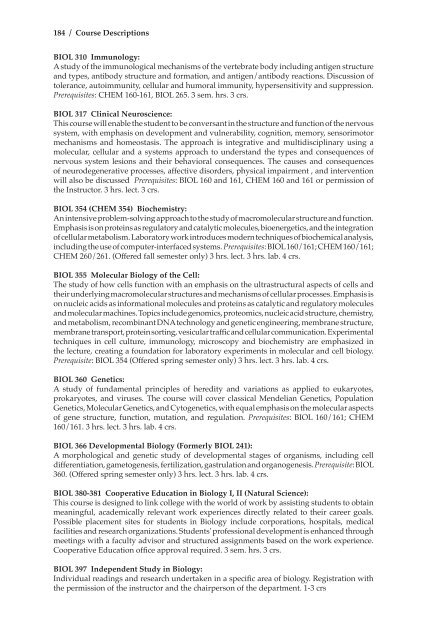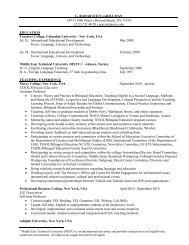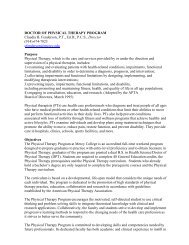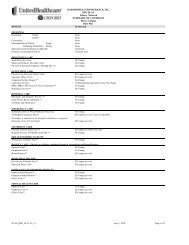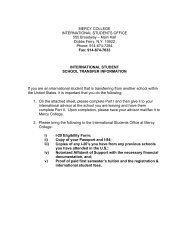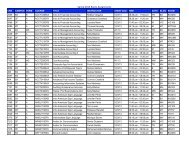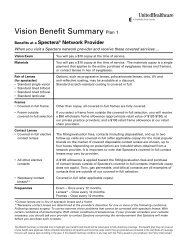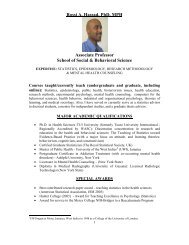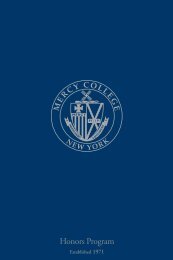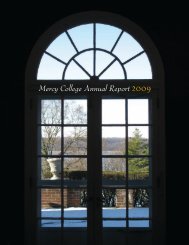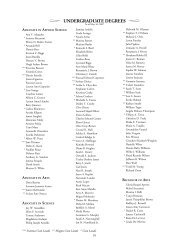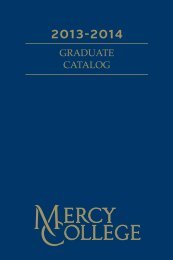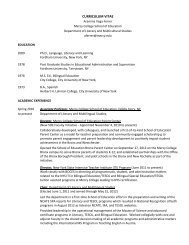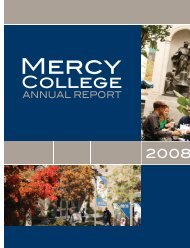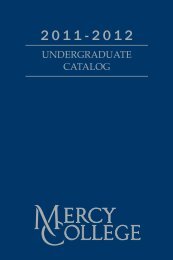UNDERGRADUATE CATALOG - Mercy College
UNDERGRADUATE CATALOG - Mercy College
UNDERGRADUATE CATALOG - Mercy College
Create successful ePaper yourself
Turn your PDF publications into a flip-book with our unique Google optimized e-Paper software.
184 / Course Descriptions<br />
BIOL 310 Immunology:<br />
A study of the immunological mechanisms of the vertebrate body including antigen structure<br />
and types, antibody structure and formation, and antigen/antibody reactions. Discussion of<br />
tolerance, autoimmunity, cellular and humoral immunity, hypersensitivity and suppression.<br />
Prerequisites: CHEM 160-161, BIOL 265. 3 sem. hrs. 3 crs.<br />
BIOL 317 Clinical Neuroscience:<br />
This course will enable the student to be conversant in the structure and function of the nervous<br />
system, with emphasis on development and vulnerability, cognition, memory, sensorimotor<br />
mechanisms and homeostasis. The approach is integrative and multidisciplinary using a<br />
molecular, cellular and a systems approach to understand the types and consequences of<br />
nervous system lesions and their behavioral consequences. The causes and consequences<br />
of neurodegenerative processes, affective disorders, physical impairment , and intervention<br />
will also be discussed Prerequisites: BIOL 160 and 161, CHEM 160 and 161 or permission of<br />
the Instructor. 3 hrs. lect. 3 crs.<br />
BIOL 354 (CHEM 354) Biochemistry:<br />
An intensive problem-solving approach to the study of macromolecular structure and function.<br />
Emphasis is on proteins as regulatory and catalytic molecules, bioenergetics, and the integration<br />
of cellular metabolism. Laboratory work introduces modern techniques of biochemical analysis,<br />
including the use of computer-interfaced systems. Prerequisites: BIOL 160/161; CHEM 160/161;<br />
CHEM 260/261. (Offered fall semester only) 3 hrs. lect. 3 hrs. lab. 4 crs.<br />
BIOL 355 Molecular Biology of the Cell:<br />
The study of how cells function with an emphasis on the ultrastructural aspects of cells and<br />
their underlying macromolecular structures and mechanisms of cellular processes. Emphasis is<br />
on nucleic acids as informational molecules and proteins as catalytic and regulatory molecules<br />
and molecular machines. Topics include genomics, proteomics, nucleic acid structure, chemistry,<br />
and metabolism, recombinant DNA technology and genetic engineering, membrane structure,<br />
membrane transport, protein sorting, vesicular traffic and cellular communication. Experimental<br />
techniques in cell culture, immunology, microscopy and biochemistry are emphasized in<br />
the lecture, creating a foundation for laboratory experiments in molecular and cell biology.<br />
Prerequisite: BIOL 354 (Offered spring semester only) 3 hrs. lect. 3 hrs. lab. 4 crs.<br />
BIOL 360 Genetics:<br />
A study of fundamental principles of heredity and variations as applied to eukaryotes,<br />
prokaryotes, and viruses. The course will cover classical Mendelian Genetics, Population<br />
Genetics, Molecular Genetics, and Cytogenetics, with equal emphasis on the molecular aspects<br />
of gene structure, function, mutation, and regulation. Prerequisites: BIOL 160/161; CHEM<br />
160/161. 3 hrs. lect. 3 hrs. lab. 4 crs.<br />
BIOL 366 Developmental Biology (Formerly BIOL 241):<br />
A morphological and genetic study of developmental stages of organisms, including cell<br />
differentiation, gametogenesis, fertilization, gastrulation and organogenesis. Prerequisite: BIOL<br />
360. (Offered spring semester only) 3 hrs. lect. 3 hrs. lab. 4 crs.<br />
BIOL 380-381 Cooperative Education in Biology I, II (Natural Science):<br />
This course is designed to link college with the world of work by assisting students to obtain<br />
meaningful, academically relevant work experiences directly related to their career goals.<br />
Possible placement sites for students in Biology include corporations, hospitals, medical<br />
facilities and research organizations. Students' professional development is enhanced through<br />
meetings with a faculty advisor and structured assignments based on the work experience.<br />
Cooperative Education office approval required. 3 sem. hrs. 3 crs.<br />
BIOL 397 Independent Study in Biology:<br />
Individual readings and research undertaken in a specific area of biology. Registration with<br />
the permission of the instructor and the chairperson of the department. 1-3 crs


